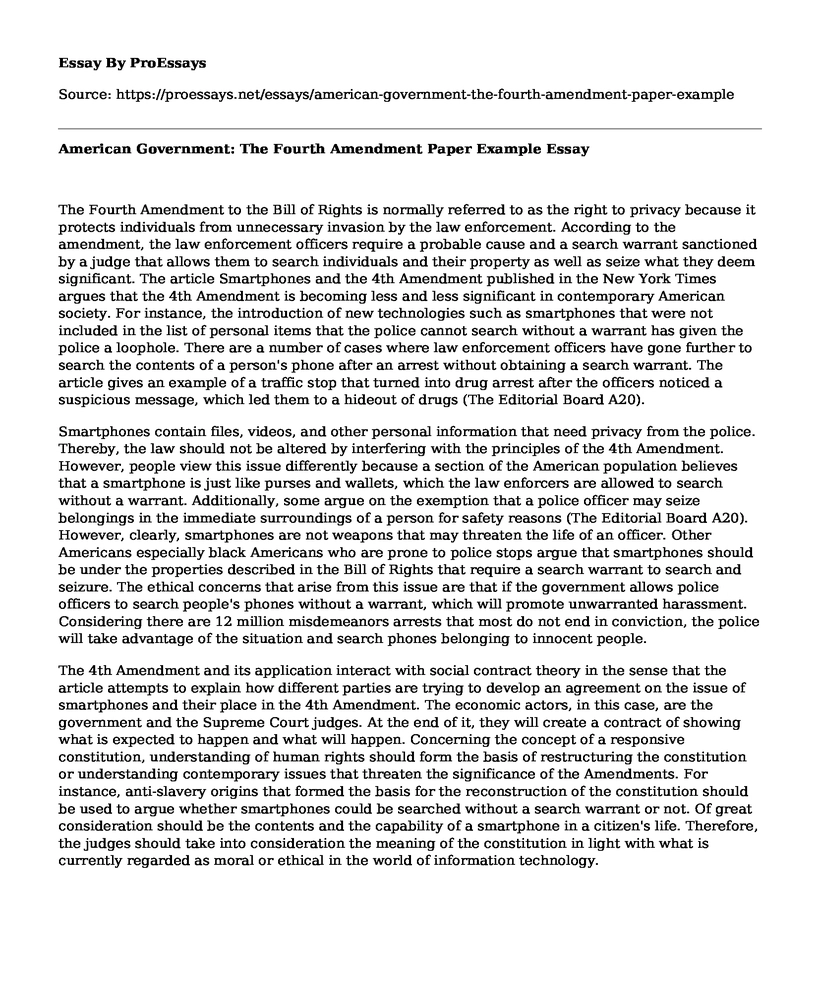The Fourth Amendment to the Bill of Rights is normally referred to as the right to privacy because it protects individuals from unnecessary invasion by the law enforcement. According to the amendment, the law enforcement officers require a probable cause and a search warrant sanctioned by a judge that allows them to search individuals and their property as well as seize what they deem significant. The article Smartphones and the 4th Amendment published in the New York Times argues that the 4th Amendment is becoming less and less significant in contemporary American society. For instance, the introduction of new technologies such as smartphones that were not included in the list of personal items that the police cannot search without a warrant has given the police a loophole. There are a number of cases where law enforcement officers have gone further to search the contents of a person's phone after an arrest without obtaining a search warrant. The article gives an example of a traffic stop that turned into drug arrest after the officers noticed a suspicious message, which led them to a hideout of drugs (The Editorial Board A20).
Smartphones contain files, videos, and other personal information that need privacy from the police. Thereby, the law should not be altered by interfering with the principles of the 4th Amendment. However, people view this issue differently because a section of the American population believes that a smartphone is just like purses and wallets, which the law enforcers are allowed to search without a warrant. Additionally, some argue on the exemption that a police officer may seize belongings in the immediate surroundings of a person for safety reasons (The Editorial Board A20). However, clearly, smartphones are not weapons that may threaten the life of an officer. Other Americans especially black Americans who are prone to police stops argue that smartphones should be under the properties described in the Bill of Rights that require a search warrant to search and seizure. The ethical concerns that arise from this issue are that if the government allows police officers to search people's phones without a warrant, which will promote unwarranted harassment. Considering there are 12 million misdemeanors arrests that most do not end in conviction, the police will take advantage of the situation and search phones belonging to innocent people.
The 4th Amendment and its application interact with social contract theory in the sense that the article attempts to explain how different parties are trying to develop an agreement on the issue of smartphones and their place in the 4th Amendment. The economic actors, in this case, are the government and the Supreme Court judges. At the end of it, they will create a contract of showing what is expected to happen and what will happen. Concerning the concept of a responsive constitution, understanding of human rights should form the basis of restructuring the constitution or understanding contemporary issues that threaten the significance of the Amendments. For instance, anti-slavery origins that formed the basis for the reconstruction of the constitution should be used to argue whether smartphones could be searched without a search warrant or not. Of great consideration should be the contents and the capability of a smartphone in a citizen's life. Therefore, the judges should take into consideration the meaning of the constitution in light with what is currently regarded as moral or ethical in the world of information technology.
Works Cited
The Editorial Board. "Smartphones and the 4th Amendment." New York Times 27 April 2014: A20.
Cite this page
American Government: The Fourth Amendment Paper Example. (2022, Sep 22). Retrieved from https://proessays.net/essays/american-government-the-fourth-amendment-paper-example
If you are the original author of this essay and no longer wish to have it published on the ProEssays website, please click below to request its removal:
- Mass Shootings, Social Contract Theory, and the Sociology of the Media Essay
- National Approach to the Mission of Homeland Security Paper Example
- Gun Control Argument on Social Media Essay
- Mismeasurement of Crime: Unfair Treatment of African Americans - Essay Sample
- Essay Example on U.S. Supreme Court Ignores Film Industry's Artistry Until Oscars
- Essay Example on IoT: Benefits, Risks, and Phishing Challenges
- Crime Statistics of 5 Major Cities - Report Example







